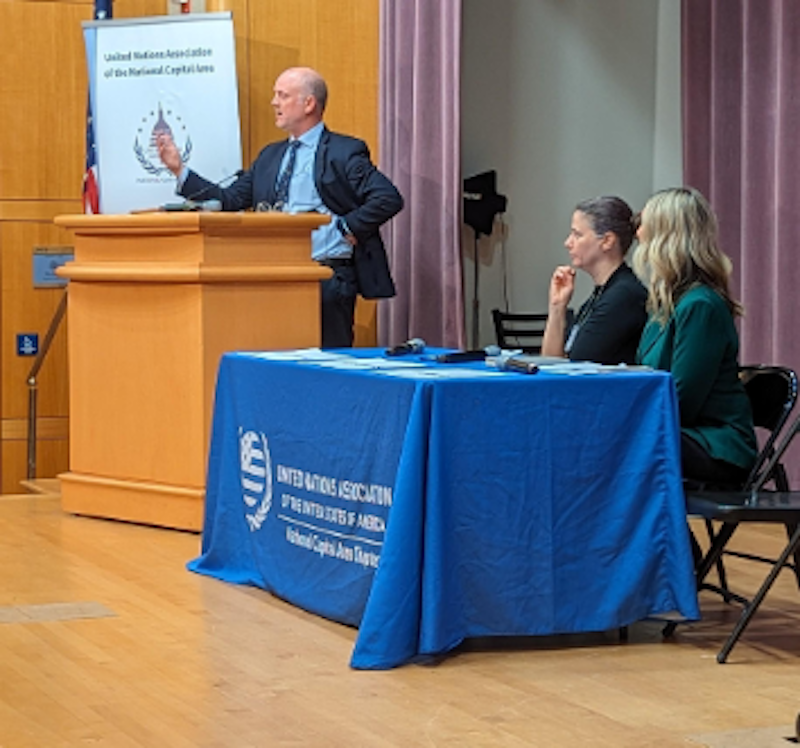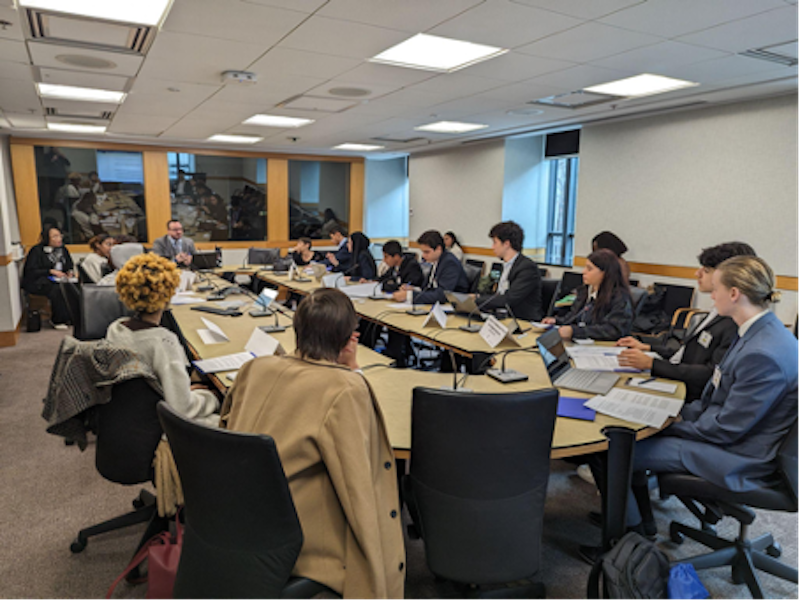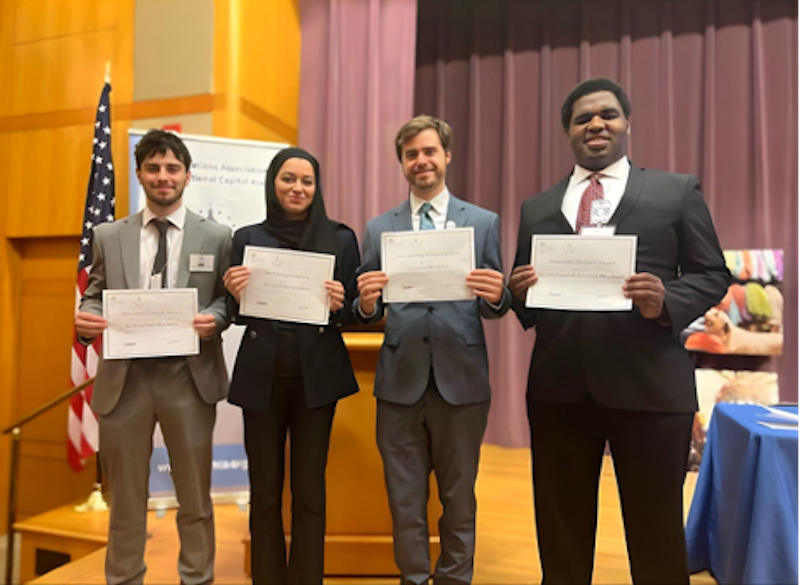Global Classrooms-DC (GCDC), the flagship education program of the United Nations Association of the National Capital Area (UNA-NCA), launched its pilot Model-ILO conference on February 23rd at the Marshall Center in collaboration with the U.S. Department of State’s Bureau of Democracy, Human Rights and Labor, the International Labour Organization (ILO) Office of the United States and Canada, and the U.S. Department of Labor (DOL) Bureau of International Labor Affairs.
The Model-ILO is a dynamic simulation exercise that mirrors the operations of the ILO. The ILO is a unique organization within the UN system, operating within a tripartite structure that emphasizes consensus-building among the three foundational pillars of the world of work: governments, workers, and businesses. The pilot conference facilitated engagement in dialogue, negotiation, and problem-solving regarding violence and harassment in the workplace, including dialogue centered around the ILO’s landmark Convention 190 (C.190) concerning the elimination of violence and harassment in the world of work. C.190 was adopted by the ILO in 2019.
 The inaugural plenary commenced with a video about the critical work of the ILO, followed by welcome remarks and introductions of speakers by UNA-NCA President Paula Boland. Stephen Moody, Director of the Office of International Labor Affairs at the U.S. Department of State, opened the session with enthusiasm, dubbing it his favorite part of the week. He engaged the delegates with an interactive quiz about the State Department and left them with three key points: stressing the value of negotiation, emphasizing multilateralism, and highlighting that delegates may one day work in these halls at the State Department.
The inaugural plenary commenced with a video about the critical work of the ILO, followed by welcome remarks and introductions of speakers by UNA-NCA President Paula Boland. Stephen Moody, Director of the Office of International Labor Affairs at the U.S. Department of State, opened the session with enthusiasm, dubbing it his favorite part of the week. He engaged the delegates with an interactive quiz about the State Department and left them with three key points: stressing the value of negotiation, emphasizing multilateralism, and highlighting that delegates may one day work in these halls at the State Department.Molly McCoy, the Associate Deputy Under-Secretary for International Labor Affairs (ILAB) at the Department of Labor, was the next speaker. She provided a thorough overview of ILAB and enumerated the Bureau’s international focus, emphasizing that our economy is global. Ms. McCoy ended the speech by highlighting how insights from the negotiations would not only contribute to the delegates’ own learning but also to conversations on creating dignified workplaces.
Amber Barth, Director of the ILO Office for the United States and Canada, followed Under-Secretary McCoy. She highlighted the unique operating structure of the ILO, outlining that, “nowhere in the world will you find a more distinct model of negotiation, collaboration, and consensus-building within the multilateral system.” She said, their “strength lies in the fact that it's not only governments which make decisions.” Representatives from ILO’s three pillars, government, workers, and businesses, delivered statements to the delegates following Ms. Barth’s remarks.
Representatives also served as policy advisors to the delegates throughout the day. They included: Sarah Morgan, Director of the Office of International Relations and Economic Research at the Department of Labor; Josh Gertsen, Foreign Affairs Officer at the U.S Department of State representing the government group; Ronnie L. Goldberg, Chief Policy Officer at the U.S. Council for International Business’ (USCIB) with the employer group; and Laura Gutierrez, Global Workers Rights Coordinator at the American Federation of Labor and Congress of Industrial Organizations (AFL-CIO) representing the worker group. Following Mr. Moody’s lead, Sarah Morgan also conducted an interactive quiz, specifically asking if delegates were able to point to ILO's fundamental principles. Mr. Gertsen, who contributed significantly in the planning of the conference, expressed his enthusiasm to see it come to fruition and highlighted the U.S. government role in the ILO conferences and negotiations. Ms. Goldberg said the employer group at the ILO is a vastly “diverse group of characters representing countries of vastly different economic, cultural, and social status….representing business’ of all sizes from micro enterprises to big multinationals,” and emphasized that it can be a complex job to reach a consensus even “just among employers.” She also said that ratification of C.190 alone will not solve the problem, and it is essential that the convention is adequately implemented (within workplaces).
Ms. Gutierrez spoke, specifically shedding light on power dynamics at work and how C.190 aims at addressing the “root causes” (i.e. power imbalances) to violence and harassment at the workplace. She underscored the connection between strengthening freedom of association and creation of safe workplaces by stating how union members are “uniquely positioned” to implement C.190, as they have collective bargaining arguments and access to grievance mechanisms at the workplace.
After the partners’ statements, delegates were dispersed into breakout rooms where they had the opportunity to discuss a fictional ILO conclusions document outlining the responsibilities of governments and social partners in alleviating workplace harassment within their respective government, worker, and employer blocs. A conclusions document is generally produced following an International Labour Conference (ILC) with the input of the government and social partners. Later, the document is thoroughly reviewed within each bloc, which may propose amendments to it. Model-ILO structured its negotiations around the amendments section of this process.
 With support from staff facilitators and their respective policy advisors, the government, worker, and employer blocs had invigorating discussions on the language of the conclusions document. The inclusion of binary gendered language and the potential problematic use of the word "modern" when discussing the contemporary workplace were among the many points of discussion regarding the conclusions document in the breakout sessions. After delegates discussed the document and curated amendments, they went to convene in the General Discussion Committee to begin the tripartite negotiations.
With support from staff facilitators and their respective policy advisors, the government, worker, and employer blocs had invigorating discussions on the language of the conclusions document. The inclusion of binary gendered language and the potential problematic use of the word "modern" when discussing the contemporary workplace were among the many points of discussion regarding the conclusions document in the breakout sessions. After delegates discussed the document and curated amendments, they went to convene in the General Discussion Committee to begin the tripartite negotiations. UNA-NCA Advocacy and Digital Outreach Manager, Sarah Bassil and Christina Hansen from the U.S Department of State, chaired the General Discussion Committee. Following a roll call, the delegates delivered opening remarks on the conclusions document and the issue of harassment in the world of work. Following a series of moderated and unmoderated caucuses, the blocs further streamlined their amendments and passed them accordingly.
The conference then swiftly moved to the closing plenary. The closing remarks were delivered by Angelika Muller, the Head of the Official Relations & Correspondence Unit at the International Labour Organization. Ms. Muller provided exceptional technical expertise to the organizers regarding the conclusions document and the rules of procedure for the conference. In her closing remarks, she shared that she was thoroughly impressed with the delegates and expressed her appreciation for the conference. The conference concluded with an awards ceremony, presented by the Chairs.
 Congratulations to all the winners and participants! The awards were as follows:
Congratulations to all the winners and participants! The awards were as follows:- Best Delegate Award: Australia (employer) delegation
- Outstanding Delegates Award: Canada (worker) delegation, India (government) delegation
- Honorable Delegates: United States (worker) delegation, Burkina Faso (worker) delegation








